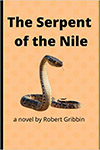Review — THE SERPENT OF THE NILE – A Novel by Robert Gribbin (Kenya)
The Serpent of the Nile: A Novel
by Robert Gribbin (Kenya 1968-70)
Independently Published
August, 2021
138 pages
$13.99 (Paperback), $3.99 (Kindle)
This novel is about an RPCV who is now a Nairobi based free-lance journalist pursuing stories of corruption, arms smuggling and human trafficking in war-torn South Sudan. He becomes caught up in the violence and intrigue that plagues the world’s most desperate nation. Set against the grim reality and history of the region, this novel accurately portrays the despair, hope and aspirations of South Sudan’s beleaguered people.
Reviewed by Alan Johnston (Kenya 1968-71)
•
The last place that you want to end up is in a prison cell in some remote part of Africa, whether that cell is controlled by a rebel group, an opposition warlord, or a government. Especially if you happen to be a journalist. Bad things happen in those cells. Yet that is exactly where we meet up with the protagonist of Robert Gribbin’s new novel, The Serpent of the Nile. As he always does, Gribbin has used his lengthy experience in many parts of Africa, including South Sudan, to provide an authentic context for this tale of insurrection and intrigue in this unstable part of Africa. By the time you have finished this short novel, much of which consists of a concise briefing on the history, culture and politics of South Sudan, you may feel ready to take up a diplomatic post in that country, but you will probably not want to do much investigative journalism there.
As it turns out, our as yet un-named journalist is soon let loose by his captor and led to the border by the captor’s son, Owino, so that the journalist can return to his base in Kenya to recover from this close call. All the characters in this novel seem quite plausible, and Gribbin reviews a comprehensive list of foreign aid organizations, UN agencies, NGOs, and diplomats from across the globe that have assembled in Juba to somehow help build a new country. The name Owino reminded me of my many Luo friends from Kenya who were serving in Juba as consultants and advisors; they even jokingly referred to Juba as “Little Kisumu.” But after a short respite our free-lance journalist friend, Paul, who happens to be a Black American who served in the Peace Corps in Kenya and who can pass as a Kenyan when it serves his purposes, is back in Juba searching for a lead on some illegal Chinese dealings, a story that he can sell to the international press.
The main problem that I have with this novel is that it is too short. It establishes a realistic context for the events of the novel, but three-quarters of the way through the book Paul is still not yet in the serious trouble that we know is coming. A more elaborate rendition of the story would get us more invested in the characters and leave us even more astounded by the outcome.
It is quite possible to spend significant amounts of time in Africa and not realize the extent to which sorcery and various spirits have such a major influence for both good and evil. Gribbin does not make that mistake. The novel’s namesake Serpent of the Nile raises its head and has a practical impact at several key junctures in the story. In fact, for many of the South Sudanese who we meet in these pages, their glimmer of hope for the future, in this otherwise forlorn country, rests in their eventual salvation by this very serpent.
•
RPCV reviewer Alan G. Johnston (Kenya 1968-71) was until his retirement in 2016 an independent consultant focusing on public health and international development, with a specialization in family planning, reproductive health and HIV/AIDS policy analysis, advocacy, and strategic planning. Before that, he worked for various organizations providing technical assistance and training to professionals and institutions in developing countries, including 11 years in long-term advisory positions (in Kenya, Nigeria, and Tanzania). and numerous short-term assignments.

Sounds like a very interesting read that should make me and others aware of many intriguing aspects of the complex world of south Sudan – a world most of us would not otherwise explore even though its complex power struggles with the oppressive Khartoum regime, The internecine warfare amongst the various rebel groups in the south and even its main driving force, the oil fields near Juba. have all cost the lives of thousands of innocent women and children, created thousands of refugees and cost the international communities and NGOs much treasure. I look forward to reading the book and I send my thanks to Alan Johnston for providing this review.